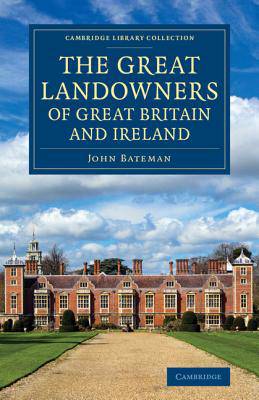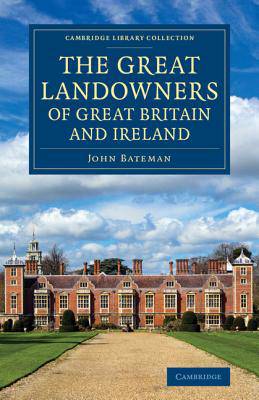
- Afhalen na 1 uur in een winkel met voorraad
- Gratis thuislevering in België vanaf € 30
- Ruim aanbod met 7 miljoen producten
- Afhalen na 1 uur in een winkel met voorraad
- Gratis thuislevering in België vanaf € 30
- Ruim aanbod met 7 miljoen producten
Zoeken
The Great Landowners of Great Britain and Ireland
A List of All Owners of Three Thousand Acres and Upwards, Worth 3,000 a Year, in England, Scotland,
John Bateman
€ 95,45
+ 190 punten
Uitvoering
Omschrijving
First published in 1876, and reissued here in the 1878 edition that covered the entire British Isles, this important work utilised and corrected the 1873 Return of Owners of Land (known as the 'Modern Domesday Book'), the first post-Norman survey of British landholdings. John Bateman (1839-1910), a landowner himself recorded here, sought to amend numerous and significant errors in the Return, increasing its usability by grouping listings by owner rather than location. He further enhanced the record by giving many college and club affiliations - indicative of religious and political alignments. An analysis chapter overviews the distribution of holdings and highlights both lucrative and low-yielding estates. Bateman's apparent hope of justifying the existing landowning system in the British Isles was undermined by data which revealed the concentration of land in aristocratic hands, yet the work provides historians with a valuable snapshot of this system in its Victorian heyday.
Specificaties
Betrokkenen
- Auteur(s):
- Uitgeverij:
Inhoud
- Aantal bladzijden:
- 518
- Taal:
- Engels
- Reeks:
Eigenschappen
- Productcode (EAN):
- 9781108075954
- Verschijningsdatum:
- 6/11/2014
- Uitvoering:
- Paperback
- Formaat:
- Trade paperback (VS)
- Afmetingen:
- 140 mm x 216 mm
- Gewicht:
- 648 g

Alleen bij Standaard Boekhandel
+ 190 punten op je klantenkaart van Standaard Boekhandel
Beoordelingen
We publiceren alleen reviews die voldoen aan de voorwaarden voor reviews. Bekijk onze voorwaarden voor reviews.











